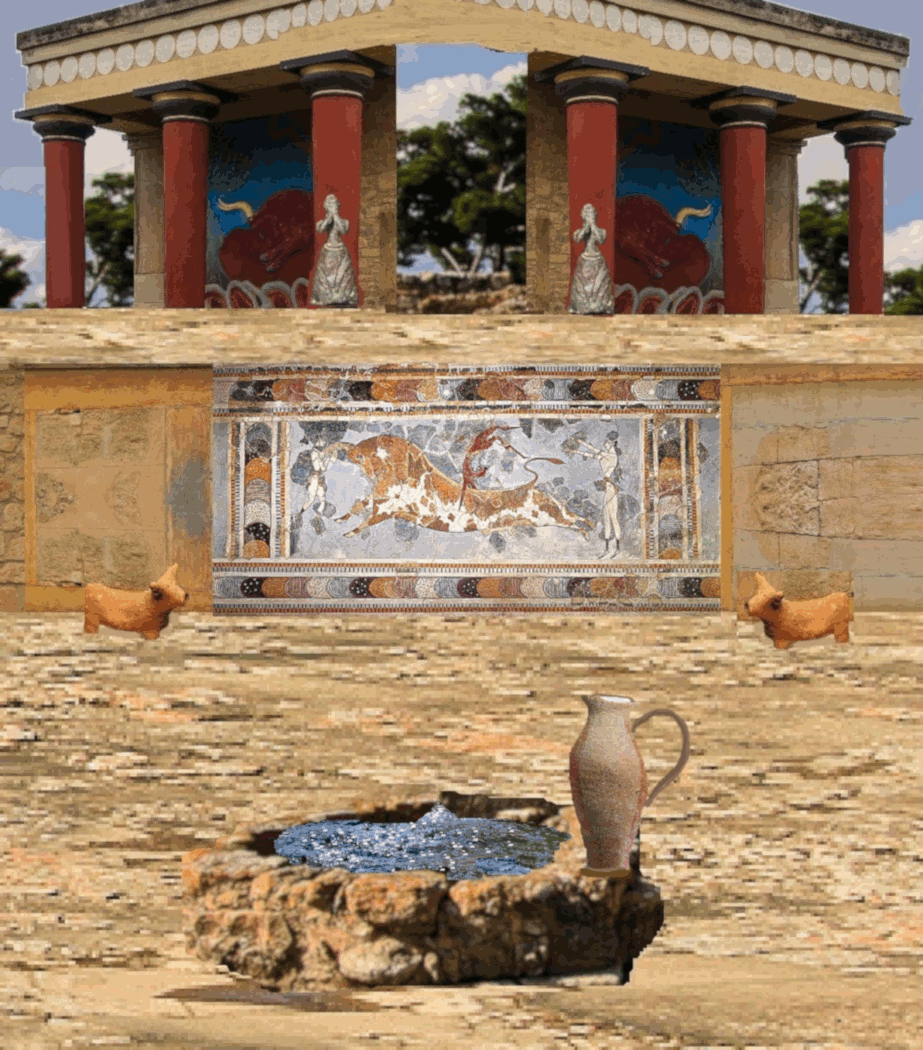
Most of the artifacts in this picture were found in the ruins of the two largest cities of the Minoan civilization, Knossos and Phaistos. The first city, Knossos, was discovered in 1900, by Sir Arthur Evans. After Sir Arthur's discovery, an Italian expedition excavated the ruins at Phaistos.
#Letsmakeacollage and @shaka's Picture of Phaistos
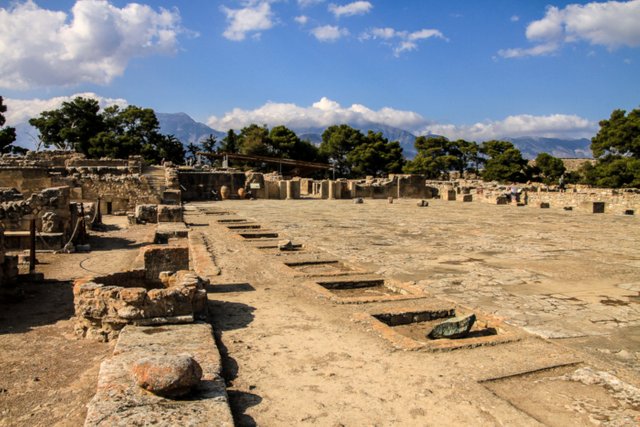
In his #letsmakeacollage contest, @shaka offers a picture and invites the Steemit community to alter his photo creatively--to make a collage. Because I'm a history hobbyist, I was immediately interested in learning more about the ruins displayed in the picture. I began to sort through images of different treasures that have been unearthed over the years and decided to create a reconstructed scene from my imagination. The scene represents archeological discoveries of Minoan civilization.
While the foundation of my collage was derived from @shaka's photo and the ruins of Phaistos, most of the other artifacts were discovered elsewhere.
Map of Ancient Crete, with Phaistos and Knossos Indicated
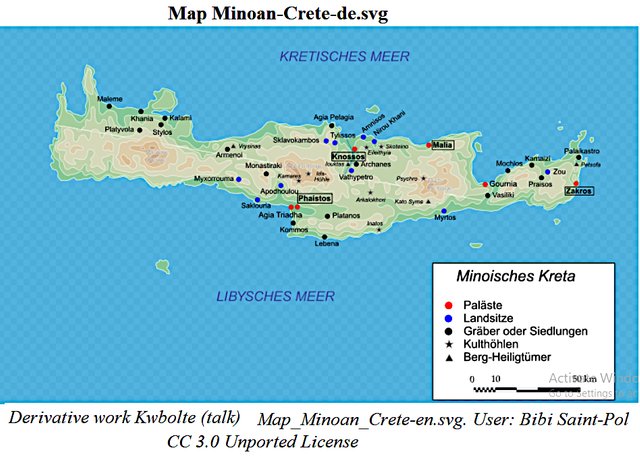
A Few Facts About the Minoan Civilization
The Minoans flourished during the Bronze Age. Their civilization existed, it is estimated, between 2600 and 1150 BC. Knossos was the capital and Phaistos was the second largest city. The Minoans carried on a lively trade with other Bronze Age civilizations: Egypt, Anatolia, Mesopotamia, Greece and Spain. Archeologists know this because of Minoan artifacts found in the different areas.
Minoan Fresco Found in Egypt, Now Located at the Heraklion Archeological Museum, Crete, Greece
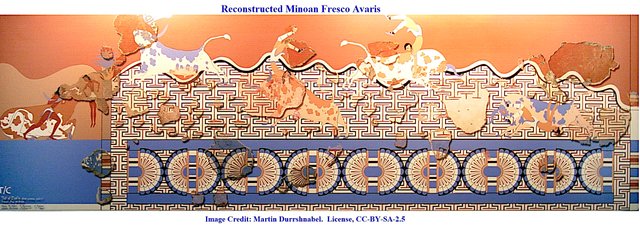
The Minoans do not appear to have been a warlike people. Although weapons are depicted in their art, many experts argue these instruments of war are shown only in ritual contexts. There is actually a lively debate (perhaps not lively--ongoing🙂 ) about whether the Minoans engaged in warfare or not. Traditionally, following a theory put forth by Evans, it was believed they were not warriors. It has even been suggested that a 'Pax Minoica' prevailed in the Aegean during the height of Minoan influence.
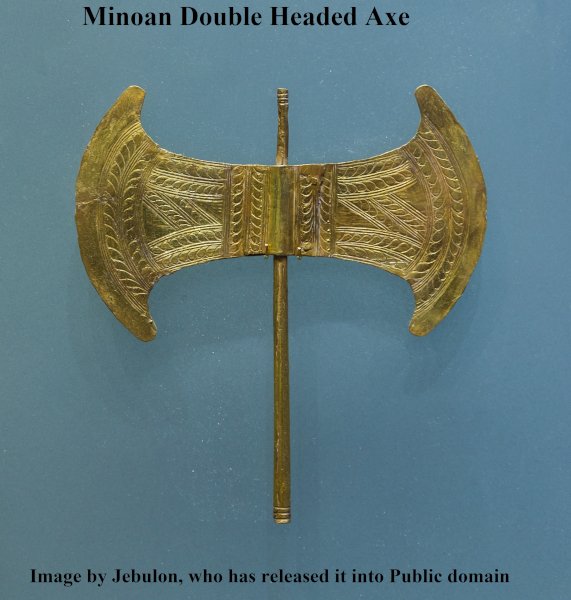
Minoan Script and Hieroglyphics
Evidence reveals that the Minoans used two types of writings. Neither has been deciphered, yet.. The oldest writings are in hieroglyphics. The newer writings are in a script that has been called Linear A. The use of hieroglyphics endured after Linear A came into use.
Once the writings of the Minoans are deciphered, many questions about this ancient civilization will likely be answered.
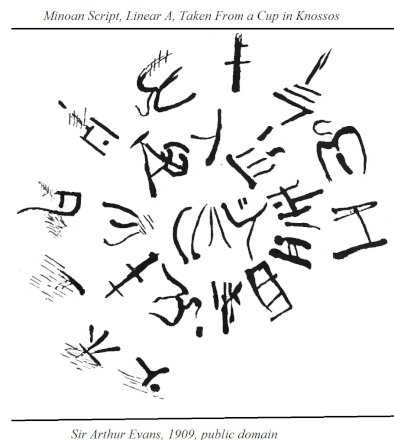
Minoan Hieroglyphics, Example: The Phaistos Disc
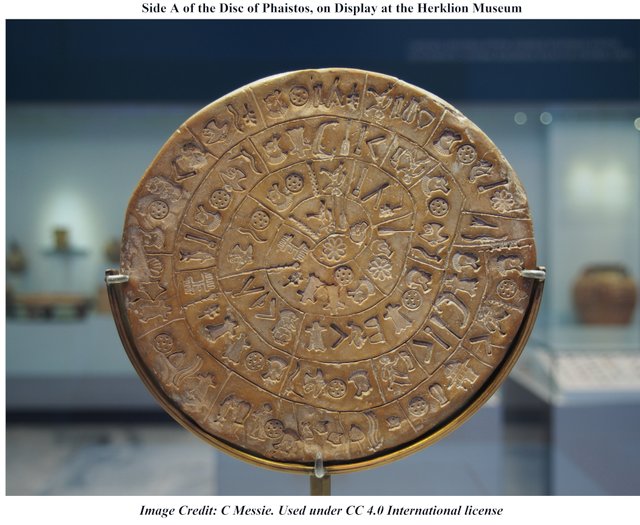
Collapse of the Minoan Civilization
What happened to the Minoan civilization? One more mystery that is unsolved. The collapse of this civilization has been attributed by some to the eruption of a volcano on the island of Santorini. The eruption is believed to have been one of the most violent recorded in the last 10,000 years. According to National Geographic, the volcano created a hole in the center of Santorini Island. This huge crater filled up with sea water and is so large it may be seen from space.
Aerial View of Santorini's Volcanic Crater
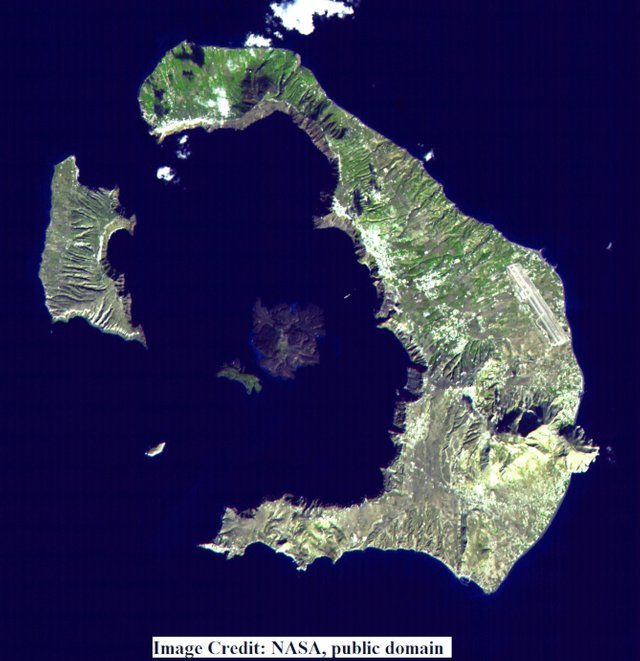
It is believed by some that the Santorini eruption caused a devastating tsunami, which inundated Crete. Fossilized evidence of sea life in Minoan ruins seems to support this theory.
The Mycenaeans
Some researchers attribute the collapse of the Minoans to the rise of Mycenaea. The Mycenaeans are described as a warlike people whose reach extended to other Aegean and Mediterranean civilizations. It is certain that the Mycenaeans adopted Minoan culture. We know more about Mycenaeans than Minoans because Mycenaean writings, called Linear B, have been deciphered.

My Collage: A Whimsical Reconstruction, in Appreciation of Minoan Culture
Identifying the Artifacts in My Collage (All in the Public Domain)
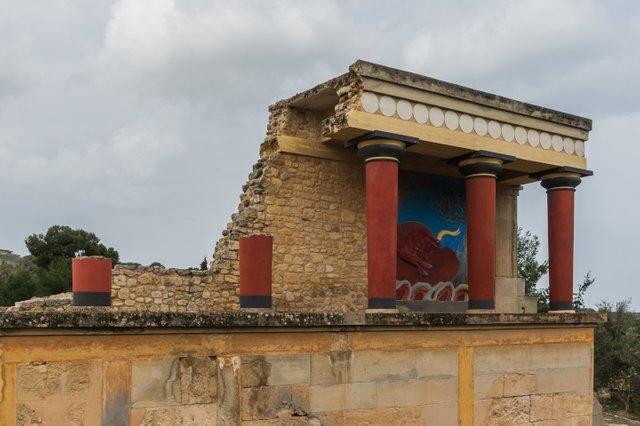
This structure may be found at the north entrance to the palace at Knossos. Note the bull fresco in the front. I took liberties in reconstructing this so that it would stand majestically over my picture, as I am certain it must have appeared at the entrance to the palace grounds thousands of years ago.
Known as the Leaping Bull Fresco, this artifact was also recovered from the palace at Knossos. Bulls were sacred in Minoan culture. It has been suggested that bull-leaping was part of a religious ritual, but this theory, as with others dealing in Minoan history, is challenged.
This statue of a female praying is identified simply as "Crete, Minoan, Middle Minoan III - Late Minoan I". The statue does not appear to have been found at either Knossos or Phaistos. I placed her in front of the columns because everything I read suggested the Minoans wove religious ritual into their daily lives.
This bull is identified as "Clay bull figurine (rhyton), Middle Minoan I - II Period, 2000-1700 BC". It apparently was not collected from either Phaistos or Knossos.
This jug is described as a Terracotta Jug, "Minoan; Jug; Vases". According to the Met Museum, Sir Arthur Evans attributed terracotta pottery to the Early Minoan Period.
The well, the greenery behind the platform and the ground surface are all taken from @shaka's photo, which shows ruins at the city of Phaistos
The water in the well was derived from a Pixabay picture atributed to Momentmal
Sparkly effects, and other embellishments were created with GIMP
The End 🙂

I hope you liked my collage, which took me on an excursion through Minoan history. I have spared you many bits of information, that I know would probably interest only me :)
If you haven't checked out @shaka's contest, do it now. There is so much energy and creativity on display. This contest has become a place of community. I hope you choose to enjoy it and possibly participate.
Some Sources Used in Writing this Blog
- Photo by @shaka
- https://archaeologynewsnetwork.blogspot.com/2010/06/palace-of-knossos-discovery-and.html#QvBMXKOrsIuUvpd2.97
- http://www.explorecrete.com/archaeology/phaistos.html
- https://ancient-greece.org/history/minoan.html
- https://www.historywiz.com/minoanseapower.html
- http://www.theancientworld.net/civ/minoans_warfare.html
- http://ancientscripts.com/cretan_hieroglyphs.html
- https://earthobservatory.nasa.gov/images/8872/santorini-volcano-greece
- https://www.nationalgeographic.com/archaeology-and-history/magazine/2017/09-10/Minoan_Crete/
- https://www.bbc.co.uk/history/ancient/greeks/minoan_01.shtml)
- http://www.flowofhistory.com/units/birth/3/FC17
- https://www.smithsonianmag.com/smart-news/gold-rings-found-warriors-tomb-connect-two-ancient-greek-cultures-180960680/
- https://www.nationalgeographic.com/archaeology-and-history/magazine/2017/09-10/Minoan_Crete/
- https://www.penn.museum/sites/expedition/bulls-and-bull-leaping-in-the-minoan-world/
- https://ancient-greece.org/culture/minoan-cult.html
- https://www.metmuseum.org/toah/hd/mino/hd_mino.htm
- https://visibleearth.nasa.gov/view.php?id=8872
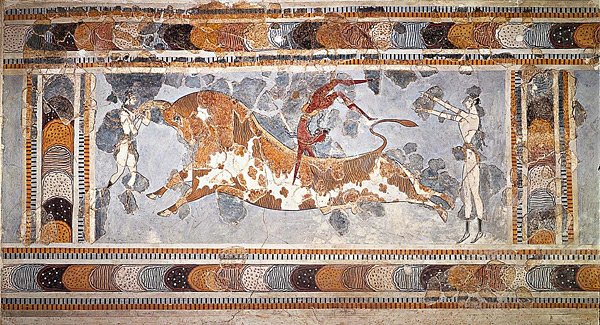
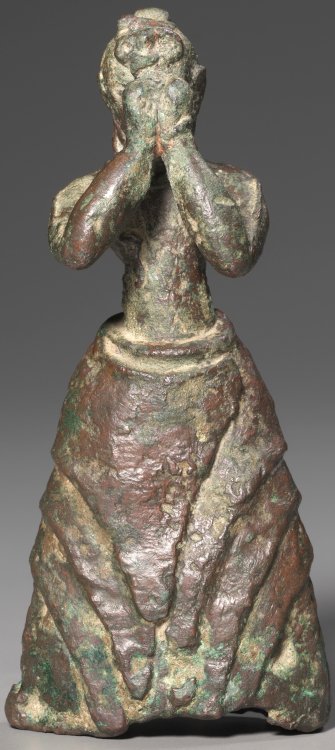
,_Middle_Minoan_I_-_II_Period,_2000-1700_BC_(28435765552).jpg)
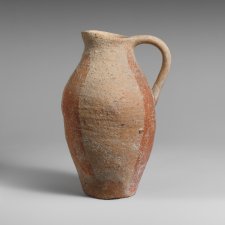
You call yourself a history hobbyist and I call myself a religion hobbyist 😊 It was then, quite interesting to learn about the Minoan’s ritual practices involving war artifacts when it is believed they didn’t engage in wars! Very curious indeed! I am definitely going to follow that link that leads to how they integrated religion to their daily routine :)
You packed a lot of information here @agmoore. Fascinating! I recall either reading or watching somewhere about that particular Santorini eruption. To think it wiped out an entire civilisation ... 😳
Your collage is, again, beautiful! You have been gifted with creativity my dear friend ❤️🌷
Thank you for providing me with a delightful read this Sunday evening. It’s time to turn the computer off and reach for my book (I have been reading The Idiot) I wish you a most wonderful week.
With great affection from Portugal :)
Abigail
Downvoting a post can decrease pending rewards and make it less visible. Common reasons:
Submit
Dear Abigail,
Thank you for visiting 😇 and for liking my collage. Even as a young student I was fascinated by the ancients, and I think that interest shows through.
I agree... the double-headed axe doesn't look too peaceful 😅 I cite sources and let the experts sort it out... once Minoan writings are deciphered we might see a different side of their civilization.
Religion and history...both paths to understanding. I also have dabbled in religious studies, comparative religion. This is unavoidable in looking at history, and prehistory.
I just reread your comment (Why not? It makes me happy). I guess you're right, I am creative. Coming up with ideas has never been a challenge...directing them sometimes is, 😄 though.
One day I would love to visit Portugal, but know I won't. So when I get your messages from Portugal, it's a little like visiting. Always a delight to hear from you. Thank you so very much!
With Great Affection,
❤❤
AG
Downvoting a post can decrease pending rewards and make it less visible. Common reasons:
Submit
How did this escape the notice of the powers that be?
Or: why didn't you tag it with steemstem?
I see you've ventured into gif-making! You're gonna leave us regular JPEGers in the dust! :D
The ancients are fascinating, probably because of the mystery surrounding them: perhaps familiarity would breed a not insignificant amount of contempt?
The collage is nicely symmetrical, true to the culture it depicts. I think it induces subliminal thirst. Or it just might be the summer here :D
Downvoting a post can decrease pending rewards and make it less visible. Common reasons:
Submit
Hello friend, Nice to see you here. I'm glad you like my gif. This is a new area for me. I'm addicted, I think.
I didn't use the STEM tag because it seemed presumptuous. I tagged it with science but this was sort of a hybrid post, art/science. And I see so many high quality solid science posts on SteemSTEM that I just felt unworthy :) It was great fun writing the post and doing the art, so I was richly rewarded.
Thanks for the endorsement. That means a great deal.
Downvoting a post can decrease pending rewards and make it less visible. Common reasons:
Submit
I think you should tag these posts with @steemstem and let the gods of
@steemstem sort them out :D
PS: I'm not for indiscriminately tagging anything and increasing moderators' workload, I just really think your post is science (archaeology, among other subjects). And it's got references and everything, and is fun to read.
Downvoting a post can decrease pending rewards and make it less visible. Common reasons:
Submit
I'll try to be more forward in the future...it's hard for me. But, your assessment really means a lot.
Hope to read your post, soon. No pressure...but I like being contrary and you take that with such good grace 😁
My 'friends' on Steemit make my life richer.
Downvoting a post can decrease pending rewards and make it less visible. Common reasons:
Submit
Nice blog bro keep sharing.
Downvoting a post can decrease pending rewards and make it less visible. Common reasons:
Submit
Congratulations @agmoore! You have completed the following achievement on the Steem blockchain and have been rewarded with new badge(s) :
You can view your badges on your Steem Board and compare to others on the Steem Ranking
If you no longer want to receive notifications, reply to this comment with the word
STOPVote for @Steemitboard as a witness to get one more award and increased upvotes!
Downvoting a post can decrease pending rewards and make it less visible. Common reasons:
Submit